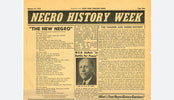
Negro History Week: Here’s the True Story Behind Black History Month
, by Natalie McGarvey , 10 min reading time

, by Natalie McGarvey , 10 min reading time
Let’s take a look at how we got here!
Most people have heard the name Carter G. Woodson, but some may not know why he’s famous or what his contributions to society are. Here’s a quick rundown to get you up to speed about the father of Negro History Week and the true story behind Black History Month.
According to the NAACP, Woodson was born in 1875, the son of formerly enslaved people. He worked on the family farm as a child and in the West Virginia coal mines as a teen, but he never really had any consistent formal education when he was younger. Still, he developed a ferocious appetite for learning, self-teaching, and mastering simple subjects. Woodson didn’t enter high school until he was 20 years old and graduated less than two years later.
He would go on to earn his bachelor’s degree from Berea College in Kentucky, traveling and working globally in the Philippines before earning a master’s from The University of Chicago then a Ph.D. from Harvard, becoming only the second Black person to do so after W.E.B. Du Bois. According to Google Arts & Culture, while working on his dissertation at Harvard, Woodson encountered two university professors who outrightly challenged Woodson’s assertion that Black people had any history at all. The professors believed that African-Americans were innately intellectually inferior and saw education as their only hope. They then challenged Woodson to present valid research to prove that Black people had a history, a history that Woodson had already spent his whole life researching, even before attending Harvard.
The scholar attempted to present his research findings but was banned from academic conferences, such as the American Historical Association Conference, despite being a member. That’s when Woodson realized that if he was going to do the job of promoting and preserving Black history, Black people would need their own institutions to house that information. In 1915, the historian and minister Jesse E. Moorland partnered, founding the Association for the Study of Negro Life and History (ASNLH), an organization funded through philanthropic efforts with the goal of researching and promoting the achievements of people of African descent, History.com reports. Today it is called the Association for the Study of African-American Life and History (ASALH). That following year, Woodson also started a scholarly journal, the Journal of Negro History, known today as the Journal of African-American History.
After nearly a decade of scholarly work, Woodson launched a national Negro History week in 1926. He chose the month of February to commemorate the birthdays of Abraham Lincoln and Frederick Douglass, two figures whose birth dates were already honored among the Black community. His celebration prompted schools and communities to organize local celebrations and establish educational initiatives to further the movement. Woodson sought for the week to serve as an overview of all the things Black people should’ve been learning all year, “emphasiz[ing] not Negro history, but the Negro in history,” seeking to make the connection of Black people and their contributions as a key building block to understanding all of American history.
After the first celebration, mayors all over the nation began recognizing Negro History Week annually and by the late 1960s, the civil rights movement helped evolve the celebration into Black History Month on college campuses. Woodson passed away before the evolution happened, at the age of 74 in 1950. However, his work continued, and his legacy continued with many answering the call after his passing. In 1976, President Gerald Ford officially recognized Black History Month, urging Americans to “seize the opportunity to honor the too-often neglected accomplishments of Black Americans in every area of endeavor throughout our history.”
Today, Black History Month continues as a way to shine a light on the vast contributions of Black people across the globe. While we too carry the torch, it is important to remember that there were people like Woodson who dedicated their life’s work to making sure we had access to the information that is so readily available today. Where there were no roads, he paved them, where doors were shut, he built houses and opened them all. May we never forget the sacrifice.
Happy Black History Month!
Negro History Week: Here’s the true story behind Black History Month/Photo Courtesy of UMass Amherst